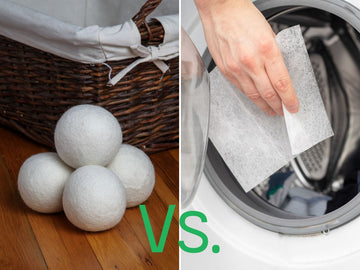Dryer Balls or Dryer Sheets: Which Is Better For You And Your Laundry?
by Matt Keasey on Apr 25, 2024
In today’s eco-conscious world, many of us are looking for ways to reduce our environmental footprint, even in our routine chores like laundry. A common decision point arises between using traditional dryer sheets and the more sustainable option of dryer balls. Both serve to reduce static and soften fabrics, but they differ significantly in their environmental impact, cost-effectiveness, health implications, and the chemicals involved.
Dryer Sheets: Convenience with a Cost
Dryer sheets are thin, polyester sheets coated with fabric softener chemicals and fragrance, used once and then thrown away. While they are convenient and widely available, they have several downsides:
-
Chemical Residue: Dryer sheets can leave a chemical residue on clothing, which then comes into contact with the skin. This can be irritating, especially for those with sensitive skin, allergies, or respiratory issues. Common chemicals found in dryer sheets include benzyl acetate (linked to respiratory irritation), benzyl alcohol (an upper respiratory tract irritant), and chloroform (a neurotoxin and carcinogen), all of which can pose health risks with prolonged exposure.
-
Environmental Impact: Being single-use, dryer sheets contribute to landfill waste. Additionally, the polyester material is not biodegradable, and the softening agents, often based on quaternary ammonium compounds, can be harmful to the environment.
-
Cost Over Time: Although individually cheap, the cost of dryer sheets adds up over time due to their single-use nature.
Dryer Balls: A Sustainable Alternative
Dryer balls, on the other hand, offer an environmentally friendly alternative. Typically made from natural materials like wool or rubber, dryer balls can be used hundreds, if not thousands, of times before needing to be replaced.
-
No Chemicals: Natural wool dryer balls are chemical-free, making them a safer choice for those concerned about toxins. They mechanically soften fabric by bouncing around in the dryer and creating space between clothes, allowing hot air to circulate more efficiently.
-
Reusable and Cost-Effective: While the initial investment in dryer balls may be higher than a box of dryer sheets, over time, dryer balls are far more economical because they can be used for many loads.
-
Energy Efficiency: By improving air circulation in the dryer, dryer balls can reduce drying time, which saves energy and reduces utility bills.
Comparison in Use
-
Softening Effect: While both dryer sheets and wool dryer balls can soften clothes, dryer sheets do so by coating the fabric in chemicals, which some might find leaves a residue that affects the feel and absorbency of towels and linens. Dryer balls keep clothes soft naturally, by physically breaking down stiffness.
-
Static Reduction: Dryer sheets are often more effective at reducing static because the chemicals they deposit on fabrics neutralize static cling. Dryer balls might not always eliminate static completely, especially in dry climates, but they can be made more effective by spritzing them with water or attaching a safety pin to reduce static.
-
Fragrance: Dryer sheets typically come scented, which can be an issue for sensitive individuals. Natural dryer balls can also carry a scent by adding a few drops of essential oils, offering a customizable and natural alternative.
Conclusion
Choosing between dryer balls and dryer sheets ultimately depends on your priorities. If you value convenience and are not bothered by the environmental and health impacts, dryer sheets might be the way to go. However, if you’re looking to make your laundry routine more sustainable, cost-effective, and health-friendly, dryer balls are undoubtedly the better choice. The benefits they bring to your home and the planet are well worth it.
You can find our locally sourced Alpaca Dryer Balls here.





